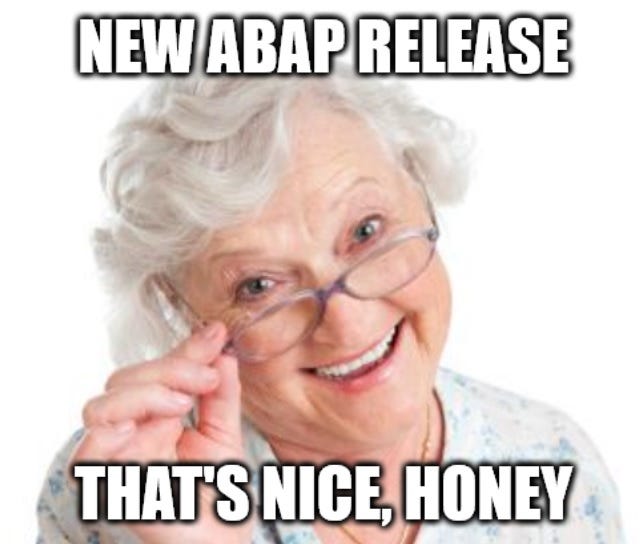In This Issue:
The Next Hottest SAP Skill
For as long as I can remember, there have been questions like “does [insert SAP product] have a future?”, “what is the best SAP module?”, “what should I learn to have a [well-paying] job in 5 years?”, etc.
Someone always jumps in to answer these because people yearn to be useful as much as they desire to know the future. But I have very bad news: no one knows what will happen in the next minute, much less in 5 years.
Any prediction would be as valid as a random number generator. Let’s spin The Wheel of SAP Buzzwords and see what comes out! Bleep, bloop, SAP BTP. Bleep, bloop, Integration Suite. Or SAP EWM. Or… [spinning] Analytics Cloud! Take your pick. Who can tell if these are wrong or right?
Granted, we can foresee with some degree of certainty what technology or product is on the way to obsoletion. And we can tell from the SAP roadmaps what is being invested in. But “correlation <> causation” and this information doesn’t necessarily have a direct influence on the job market. Five years down the road, you might as well be the last person who knows SAPScript or Web Dynpro, and desperate ECC customers will be throwing money at you. Or you could end up among thousands of the unemployed BTP “experts” who took the same course. It’s a game of supply and demand. And you’re not the only one playing.
That doesn’t mean we should all just give up and drift through life aimlessly, though. But instead of chasing the next hottest skill, I have a simple piece of advice for anyone who wants to have a successful career. Write this down, folks. Become really good at something you’re interested in.
I don’t subscribe to the idea that "if you do what you love, you'll never work a day in your life." Most of us will still need to work even if we’d rather sleep or play video games instead. But it sure is easier when you do what you like. History also isn’t full of famous people being great at things they hate. Leonardo wasn’t going around asking “suggest me what to do”. He just did what he loved. And if you want an SAP portfolio named after you in the future, I recommend the same. JP
We Hereby Declare Ourselves Awesome

We've been hearing about SAP Build for a couple years now. The three main flavors capture a great deal of what ERP/enterprise development boils down to these days. But what I'm always looking for are stories - do vendors' claims about their products match the reality on the ground? And while I hear good things from folks I know at Mindset, I haven't heard much outside those hallowed walls.
I saw a thing float by from GigaOm: "CxO Decision Brief: SAP Build", and was intrigued. But as I read, the intrigued-ness faded. I'd hoped to hear outside knowledge, but it's a report…commissioned by SAP. When the vendor sponsors the report, you have to take all claims with a grain of salt. A few things I flagged, positive and otherwise:
"Scarcity of experienced developers, particularly senior-level talent where salaries have risen over 25%...force organizations to make critical decisions" - if the scarcity bit is true, why mention the rising salaries? Are the people scarce, or are orgs willing to pay people scarce?
Report says there's a 4-6 week platform onboarding period where dev velocity slightly decreases, and then after that, increases. Even on a paid-for report, I believe that factoid.
"...the Joule AI assistant can accelerate key development tasks…by up to 30%" (emphases mine). "Can" and "up to" are often hints that there's no solid information. I would love to learn about Build’s AI assisting developers, but it’s not happening here.
"Existing custom frameworks may require refactoring to align with CAP architectural patterns." This is not a strike against Build or CAP - it would be true of any platform change.
Real people who are really using Build, please speak up. I want to hear outside of my comfort/colleague zone. PM
Minimum Viable Misunderstanding
Say what you want about Agile, but the concept of MVP (Minimum Viable Product) is very sensible. Yet, in SAP projects, we don’t always see it embraced with open arms. Why?
The main idea behind MVP is to do the least amount of work possible to get useful feedback from customers. This sounds great if you’re working on a mobile banking app, for example. You want customers to be happy with the app and are interested in what they have to say about your creation. In the SAP world, let’s be honest—there is usually very little concern about what customers (which we call “users”) think about the result. Because what are they going to do, find another job? HA!
Also, pushing an MVP out to get feedback only makes sense if you actually plan to act on it. And despite having all the Agile decorations, SAP projects very rarely end in a real iteration cycle. Something gets delivered, and the project team quickly gets disbanded and goes back to routine work.
This leads to another problem: defining an MVP in the first place. When business folks hear about MVP, they mostly hear the “minimum” part and not the “viable” part. “What do you mean we’re getting a minimum?! This project is costing us big bucks!” The result is never-ending additions to the “product” and a go-live date that rides into the sunset. We tend to forget that “done is better than perfect.”
So, how do you get out of the Land of MVP Confusion? I think the solution is as simple as applying the MVP concept exactly as it was intended: balancing “minimum” with “viable” and having an honest intention to follow up with improvements. JP
Where Is Software Development Going?
Give a watch to this interesting panel, including Martin Fowler "Pioneer of Various Topics around Object-Oriented Technology & Agile Methods". They touch on a few great thought-leader-ish topics, like LLMs, quantum computing, and writing books. As always, I'm tuned in most attentively to the AI discussion.
There's a vague sense of agreement that even with AI software development will still be around in the future, but some interesting nuances within. Holly Cummins says "If you ask a software developer in 20 years, they'll still say people are annoying and everyone does it wrong" - I know enough developers to know that if development exists in 20 years, Holly will be right. Fowler agrees but notes that the kinds of things we do as programmers will change. Even now, generative AI tools are good at coming up with first drafts and ideas, and can do great things for codebase understanding (combined with ASTs and knowledge graphs).
Two other panelists' quotes capture my mind. Trisha Gee isn't worried about LLMs/AI, as she says "The real work of programming is thinking." Daniel Terhorst-North is OK with LLMs/AI providing better tools: "now we have tools helping me do lifting, so that I can do thinking!" In principle, these are great positions! I would love a world where my most important task was to think, and AI carried out my every ask immediately!
But what if the best way to do that was to create machines that also do the thinking? Of what economic value (note that I'm qualifying value with "economic" here) are we workers, if machines do the things we do more cheaply? I’m not claiming that current ChatGPT or Claude models can think like we can. I'm simultaneously not claiming that it's impossible for them to do so in the future. PM
ABAP Release News: WIIFM?
There must be some reason and good use for the recently announced new ABAP features. But, like Tom Hank’s character in the famous movie scene, I don’t get it.
CDS types keep multiplying and now we have table entities. This seems in line with SAP’s strategy of moving away from DDIC and “decoupling” everything. But then there is the note that these are not supported by ABAP RAP. So, uh… what do we do with them then?
Then there are “writable view entities”. I diligently read Help article (it’s very short) and did not understand anything. I know the words but put together, what do they mean? If someone can make sense of it, please let me know in the comments.
Have you ever dreamt of declaring a client column of a client-independent data source? No? Well, now you can, anyways.
This new feature in ADT sounds interesting: IDE Actions. There is this Help, this blog post and even the video that all describe how you can create one. But what are they exactly? What do they do? What problems do they solve? Are these like Excel macros? Can we use these for some sort of DIY Joule? Unfortunately, I still don’t have a clear answer myself.
I really miss recently retired Horst Keller’s blog posts (exhibit A) where he shared examples with enthusiasm and always made me look forward to an upgrade (or even plead for it). Now it’s like cool story, bro, but what do we do with all this? JP
Old News For Nerds, Non-Nerds: "Huh?"
You can't avoid talk of AI agents. The idea is incredibly promising: offload a bunch of your tasks to an AI that can reliably handle them without too much input from you. It feels like every enterprise software vendor in the world sees a path to agentic something-or-other.
So why not have an agent help me gather information about agents? I've used Deep Research tools from OpenAI, Google, and Perplexity, and found that at the moment OpenAI's feels the best. So I focused Deep Research on Agentforce to try to find stories of real people using it. When I read what ChatGPT came back with, I was initially disappointed. I followed the links, and it seemed like nobody was talking about using Agentforce for actual work. It was either Salesforce-created case studies (which are appreciated but also, like any vendor made case studies, give you the sense of papering over the real story) or techies complaining on forums about general-purpose AI problems.
I thought ChatGPT just wasn't finding stuff. Agentforce has been around for forever! I mean, hello: October 2024 was the GA announcement. I went straight to Google and found the same. Beautiful Salesforce videos, and vague techie complaints not anchored to a real use case. And it hit me: October 2024 is the Stone Age in terms of AI tools for AI dorks like me, but if you just want to get stuff done for your business…you might not even have heard of Agentforce.
The velocity of AI tools and announcements greatly exceeds businesses' ability to exploit them. I can't tell you if any of the enterprise agent tools work well - adoption just isn't there yet. What feels like old news to us largely hasn't even broken through to the non-nerds. PM
Watch Nerdletter Talk on our YouTube channel for insightful commentary and bonus content.
Top of the morning, lads and lassies! Celebrate St. Patrick’s day by spending some green to support the Boringverse! Cheers!









Isn't the MVP approach just a marketing euphemism for "trial an error" programming of less skilled programmers who do not really understand the business problem but just want to deliver some kind of "increment" to keep their IT manager happy? Rating quantity of increments over quality?
Is this is really the better approach over understanding the business problem first before shelling out some code pretending being MVP?